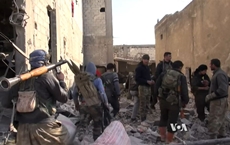Guns fall silent as Syria ceasefire begins
27 Feb 2016
A complex, but fragile, ceasefire deal agreed to by Russia and US, which excludes large parts of the country, came into force in Syria, at midnight of Friday-Saturday, after about 97 fighting groups and the Syrian government also signed on the dotted lines.
 The temporary and partial truce seems to have stopped fighting in most parts of western Syria, although Syria's state news agency said a car bomb had exploded on the edge of a government-held central town of Salamiyeh, killing two and wounding several others.
The temporary and partial truce seems to have stopped fighting in most parts of western Syria, although Syria's state news agency said a car bomb had exploded on the edge of a government-held central town of Salamiyeh, killing two and wounding several others.
A monitoring group said early on Saturday that fighting appeared to have stopped across most of western Syria, but a Syrian rebel group called First Coastal Division in the Jabal Turkman area near the Turkish border in Latakia province, in the country's northwest, said it came under attack from government ground forces at 4 am local time, which left three fighters dead.
The United Nations security council on Friday unanimously demanded that all parties to the civil war in Syria complied with the terms of the US-Russian deal, which took effect at midnight of Friday-Saturday local time.
Briefing the Council by satellite from Geneva before the vote, Staffan de Mistura, the secretary-general's special envoy for Syria, said the cessation of hostilities was the result of lengthy and detailed discussions and the outcome of intense negotiations at the highest level, adding that it was a ''major achievement''.
''Much work for the implementation of the agreement lay ahead,'' he continued, stressing that Saturday would be a critical day and warning that there would be no shortage of attempts to undermine the process under way. ''The international community must work fast to address any incidents that may arise, while all parties must demonstrate restraint.'' He announced that, provided the cessation of hostilities held and humanitarian access was kept open, he intended to reconvene formal Syria peace talks in Geneva on Monday, 7 March.
Russian President Vladimir Putin said he will take personal charge of Syria ceasefire effort. He also said Saturday would be critical, adding he had ''no doubt there will be no shortage of attempts to undermine this process''.
''This will remain a complicated, painstaking process,'' he told the council. But he added that ''nothing is impossible, especially at this moment.'' He said that any military response to the cessation of hostilities would be a ''last resort'' and ''proportionate''.
He also confirmed he will seek to convene peace talks lasting three weeks on 7 March in Geneva.
The US ambassador to the UN, Samantha Power, attacked the Russians for continuing to ramp up military attacks hours before the ceasefire. ''Let us be real. It is going to be extremely challenging to make this work, especially at the outset,'' she warned.
But, she said: ''If this collapses we lose the most tangible opportunity to relieve the suffering,'' demanding that the violence must end. ''Even a partial de-escalation would make a real difference in the lives of Syrians,'' she added.
Military analysts said the only ceasefire zones that would be implemented were in northern Hama, Dara'a, al-Ghaab plains, northern Homs and eastern Qalamoun. Government forces are expected to continue their wide-scale offensives in the Aleppo and Latakia governorates.
Syria's army said this week it would exclude Darayya, an important rebel town near Damascus, from the cessation of hostilities because forces there included al-Nusra fighters.
Turkey has reservations about the viability of the ceasefire plan for Syria due to continued fighting on the ground. President Recep Tayyip Erdogan's spokesman, Ibrahim Kalin, also signalled that recent tensions between Turkey and the US may be easing as Washington has become more ''careful'' in its support for Syrian Kurdish YPG fighters.
Speaking in Washington on Thursday, President Barack Obama put the onus firmly on the Assad regime and Russia, saying the "world will be watching" whether they keep to the truce.
US state department spokesman Mark Toner said Washington had received assurances from Moscow that it would not bomb the "moderate opposition" after the truce.



















